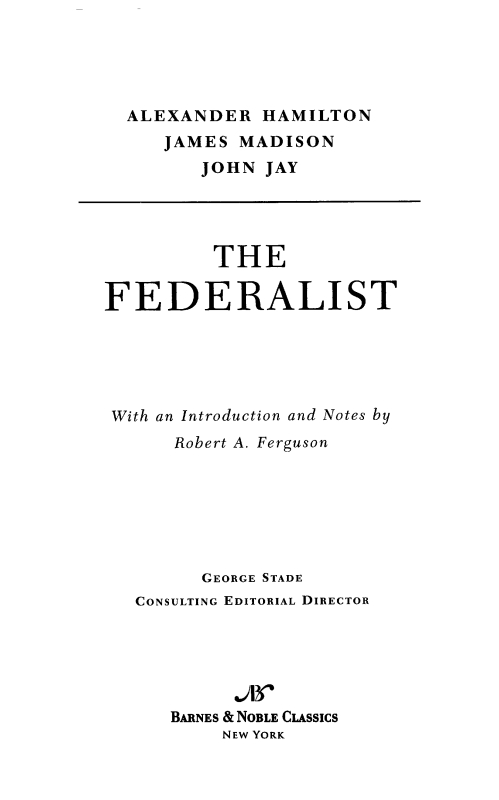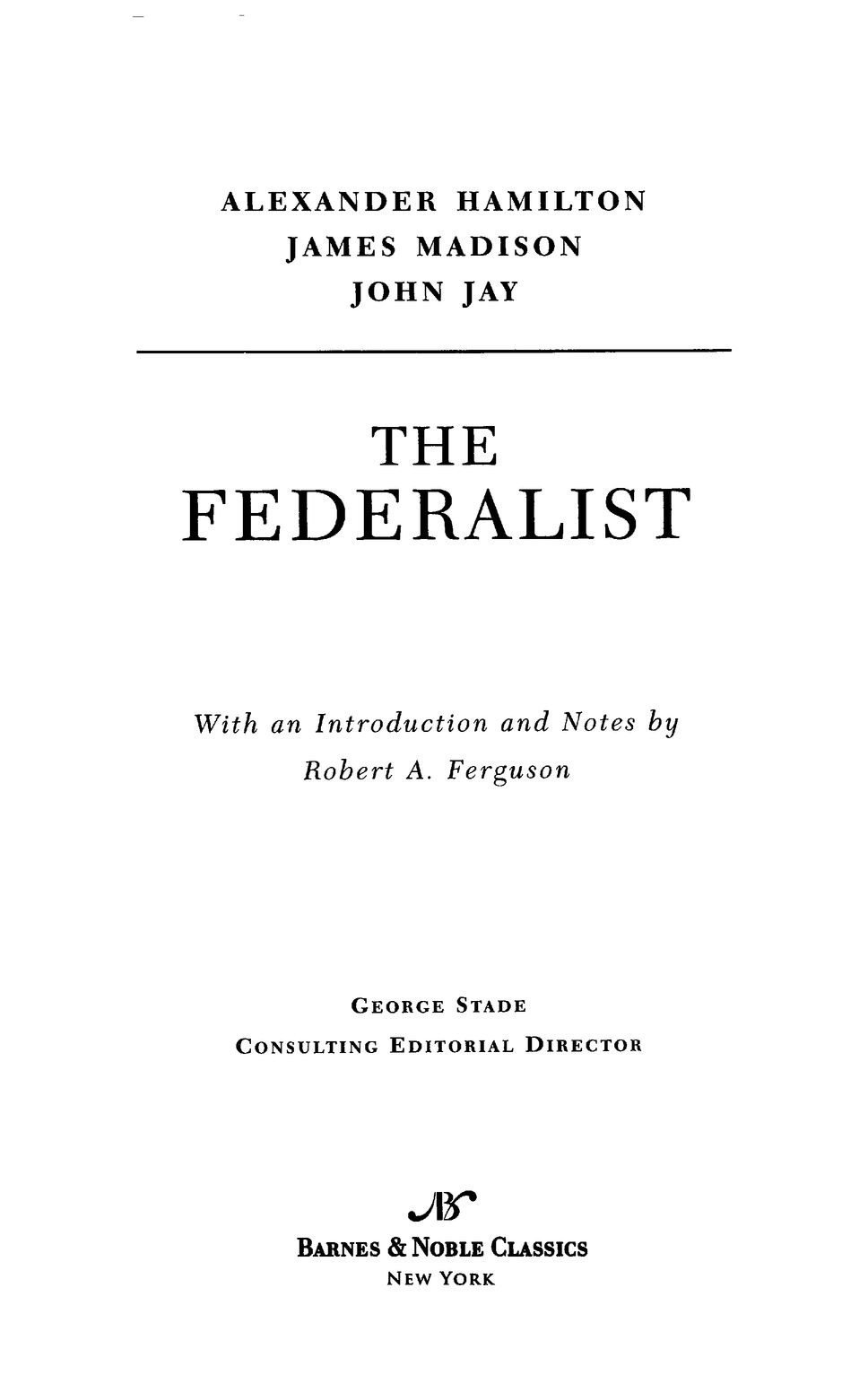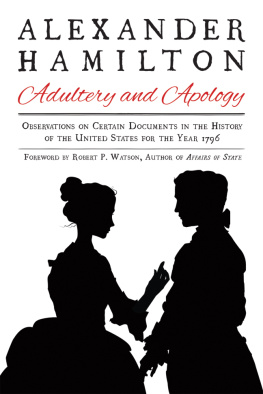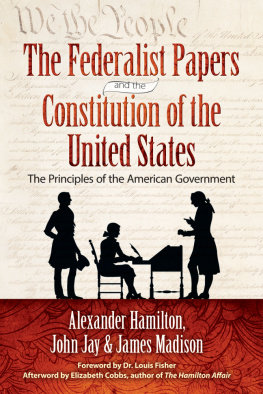
Table of Contents
FROM THE PAGES OF
THE FEDERALIST
After full experience of the insufficiency of the existing federal government, you are invited to deliberate upon a New Constitution for the United States of America. (No. 1, page 9)
Let Americans disdain to be the instruments of European greatness ! Let the Thirteen States, bound together in a strict and indissoluble union, concur in erecting one great American system, superior to the control of all transatlantic force or influence, and able to dictate the terms of the connexion between the old and the new world! (No. 11, page 65)
What are the chief sources of expense in every government? What has occasioned that enormous accumulation of debts with which several of the European nations are oppressed? The answer plainly is, wars and rebellions; the support of those institutions which are necessary to guard the body politic against these two mortal diseases of society. (No. 34, pages 178-179)
It is a misfortune, inseparable from human affairs, that public measures are rarely investigated with that spirit of moderation, which is essential to a just estimate of their real tendency to advance, or obstruct, the public good. (No. 37, page 194)
Not less true is it, that the liberties of Rome proved the final victim to her military triumphs, and that the liberties of Europe, as far as they ever existed, have, with few exceptions, been the price of her military establishments. A standing force, therefore, is a dangerous, at the same time that it may be a necessary, provision. On the smallest scale, it has its inconveniencies. On an extensive scale, its consequences may be fatal. (No. 41, page 226)
But what is government itself, but the greatest of all reflections on human nature? If men were angels, no government would be necessary. If angels were to govern men, neither external nor internal controls on government would be necessary. In framing a government which is to be administered by men over men, the great difficulty lies in this: you must first enable the government to control the governed; and in the next place oblige it to control itself.
(No. 51, page 288)
Who are to be the electors of the federal representatives? Not the rich, more than the poor; not the learned, more than the ignorant; not the haughty heirs of distinguished names, more than the humble sons of obscure and unpropitious fortune. (No. 57, page 317)
A good government implies two things: first, fidelity to the object of government, which is the happiness of the people; secondly, a knowledge of the means by which that object can be best attained. Some governments are deficient in both these qualities: most governments are deficient in the first. I scruple not to assert, that, in the American governments, too little attention has been paid to the last. (No. 62, page 345)
Though individual oppression may now and then proceed from the courts of justice, the general liberty of the people can never be endangered from that quarter: I mean, so long as the judiciary remains truly distinct from both the legislature and the executive. For I agree that there is no liberty, if the power of judging be not separated from the legislative and executive powers.
(No. 78, page 429)
Nothing need be said to illustrate the importance of the prohibition of titles of nobility. This may truly be denominated the corner stone of republican government for so long as they are excluded, there can never be serious danger that the government will be any other than that of the people. (No. 84, page 473)
A NATION without a NATIONAL GOVERNMENT, is an awful spectacle. The establishment of a constitution, in time of profound peace, by the voluntary consent of a whole people, is a PRODIGY, to the completion of which I look forward with trembling anxiety.
(No. 85, page 487)

ALEXANDER HAMILTON,
JAMES MADISON, AND JOHN JAY
The document now known as the Constitution of the United States was composed in 1787 by the fifty-five delegates of the Constitutional Convention in Philadelphia. A declared compromise of divergent interests, its authority in the new nation at the time was by no means assured. A national debate on its legitimacy ensued. To the federal Constitutions defense came James Madison, Alexander Hamilton, and John Jay; sharing the pen name Publius, the three men argued the new Constitutions merits in a series of essays that became known as The Federalist.
In the eyes of many Americans, the proposed Constitution was an invitation to tyranny that neglected individual liberties even as it closed gaping holes in the nations existing system of governance. The new document seemed most threatened in Hamiltons state of New York. In response, Hamilton conceived a public relations effort to promote the Constitution, by publishing pro-ratification treatises in the major newspapers. In all, eighty-five essays by the three authors appeared: John Jay authored five, Madison twenty-nine, and Hamilton fifty-one.
Alexander Hamilton (c.1755-1804) was born on the Caribbean island of Nevis, the illegitimate son of a married woman and a struggling Scottish businessman. After the death of his mother, Hamilton left the West Indies for New York, where he settled in 1772. Bright and ambitious, he enrolled in Kings College (now Columbia University), intending to become a doctor. Serving as General George Washingtons aide-de-camp during the Revolutionary War, he became a member of the Constitutional Convention in 1787. Hamilton, who believed economic prosperity required a strong government, was an outspoken proponent of centralized government and the architect of the countrys financial institutions. He later served as the first secretary of the Treasury (1789-1795), exerted significant influence over foreign policy, and played a crucial role in shaping the government. His caustic wit earned him many enemies, including Aaron Burr, whose political career suffered under Hamiltons criticism. Burr challenged Hamilton to a duel and on July 11, 1804, delivered a mortal wound. Hamilton died the next day.
James Madison ( 1751-1836) was the son of a Virginia planter and a member of the southern aristocracy. Though his health kept him from military service, he was active in revolutionary politics in his home state and was chosen for the Continental Congress (1780) and then the Constitutional Convention. Because of his efforts and influence at the convention, he is sometimes called the father of the Constitution. Madison served in the U.S. House of Representatives from 1789 to 1797 and was secretary of state for eight years under Thomas Jefferson, whom he helped in engineering the Louisiana Purchase. In 1809 Madison succeeded Jefferson and was elected the nations fourth president; he won a second term in 1812 and, although a proponent of peace, led the United States to victory in that years war with Britain. Madison was the last of the leading founders to die when he passed away on June 28, 1836.
John Jay (1745-1829) was born in New York City. He became an attorney in 1768 and gained early fame with The Address to the People of Great Britain (1774), a tract outlining colonial demands on the mother country, which Jay wrote while representing New York in the First Continental Congress. He drafted New Yorks earliest constitution and in 1777 was made the states first chief justice. Minister to Spain from 1779 to 1782, he spent much of the Revolutionary War on diplomatic service in Europe, where, along with Benjamin Franklin, he negotiated the Treaty of Paris, which was signed in 1783. Jay did not attend the Constitutional Convention, but his work in foreign affairs in the late 1780s under the encumbering Articles of Confederation shaped his support for a new U.S. Constitution; his five
Next page








